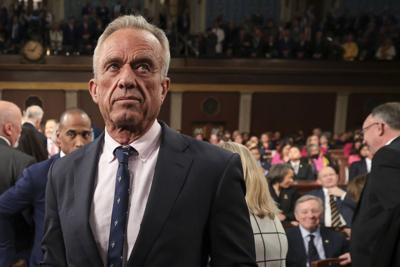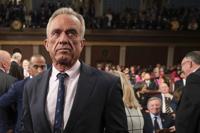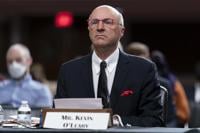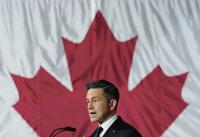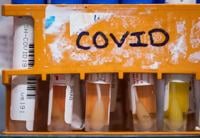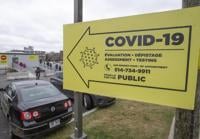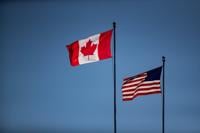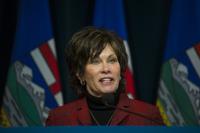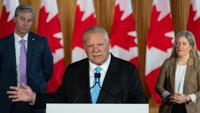United States health secretary Robert F. Kennedy Jr. made multiple claims about measles during an interview on Fox News that aired March 11. His claims — made amid a rise in measles cases across Canada and the United States — are misleading. According to a pediatric infectious disease physician and the available science-based evidence on measles, Kennedy's claims lack context and downplay the effectiveness of the measles vaccine as the best available prevention for the virus.��
U.S. health secretary Robert F. Kennedy Jr. made several claims related to measles vaccines and treatment that aired March 11.��
His comments included claims about the effectiveness of the measles vaccine, a rise in measles cases among young children being attributed to their vaccinated mothers' lack of "maternal immunity," and a claim that vitamin A is widely effective against "serious disease and death."
Kennedy previously made false claims about measles and vaccine safety and was the subject of a ���ϳԹ��� Press fact check in November after he made misleading claims about the health impacts of fluoride.��
His claims come amid rising measles cases and outbreaks in both the United States and .��
According to the Public Health Agency of Canada, in the first two months of 2025 than all of 2024, which it attributes to outbreaks in Ontario, Quebec, New Brunswick and Manitoba among mostly unvaccinated children.��
Rating: Misleading
"When you and I were kids, everybody got measles. And the measles gave you protection, lifetime protection against measles infection. The vaccine doesn't do that," Kennedy told Fox News host Sean Hannity during the interview.��
Kennedy is correct when he says contracting measles affords lifetime immunity to the disease.��
Most major health organizations presume people born before 1970 have natural immunity to measles due to exposure.��
People who recover from measles become immune; otherwise, Health Canada's is two doses of the vaccine for children and one dose for adults born after 1970.
Experts consider vaccination the best way to protect against measles because the disease is both highly contagious and can cause serious adverse effects, including blindness, encephalitis and death, and most people who die from measles are under the age of five.��
According to Health Canada and the U.S. Centers for Disease Control and Prevention, up to 9 in 10 people without immunity to measles will get the disease if they are in close proximity to an infected person.��
The (WHO) says measles epidemics occurred around every two to three years and caused around 2.6 million deaths per year before the introduction of a measles vaccine in 1963.��
This contradicts a claim Kennedy made later in the interview about measles not historically having a high fatality rate.
The WHO estimates vaccination prevented around 60 million deaths between 2000 and 2023.��
Vaccine effectiveness
Kennedy claimed the measles vaccine doesn't provide the same lifetime immunity against the disease as exposure and he said the vaccine's effectiveness wanes by about 4.5 per cent each year.��
However, two doses of the measles vaccine is 97 per cent effective at preventing measles, according to the CDC, and there is no evidence the vaccine "wanes" by 4.5 per cent each year as Kennedy claims.��
There have been documented measles cases among people with a history of immunity, .��
Two found gradual waning of measles vaccine effectiveness over time (about 0.22 and 0.04 per cent a year, respectively) but noted the vaccine is the best protection against measles and vaccine effectiveness remains high for all ages.��
Dr. Jacqueline Wong, a pediatric infectious diseases physician and assistant professor at McMaster University, said no vaccine provides 100 per cent protection.��
However, "measles immunization works very well," she said.��
"After a first dose … roughly 93 per cent of people will respond, meaning they develop antibodies. One of the reasons why we give a second dose is to boost the percentage of people that respond to the vaccine," she said.��
Giving a second dose of the vaccine boosts the percentage of people who respond to the vaccine to 97 per cent, Wong said.��
Maternal immunity
“It used to be that very young kids … they were protected by breast milk, and by maternal immunity. Women who get vaccinated do not provide that level of maternal immunity to the natural measles infection, so you’re now seeing measles hit very very young kids,” Kennedy said during the interview.��
Kennedy is referring to maternal antibodies transferred to a fetus through the placenta, which enter the bloodstream and protect the fetus while its immune system matures.��
There are different types of antibodies; the type of antibody transferred through breast milk is called .��
One found that naturally immune mothers (those who acquired immunity through pre-vaccine exposure to infection) had higher antibody levels than vaccinated mothers, meaning they transferred higher levels of antibodies to their children.��
However, the study found the protective level of antibodies dropped in the seven to eight month age group and was "far below" at the one year mark.��
Wong said one of the reasons public immunization programs advise infants receive the first dose of the measles vaccine after their first birthday is because evidence shows maternal antibodies wane after the first six months.��
"So we want to start providing protection to young infants by offering them the vaccine so that they can develop antibodies on their own to the infection," Wong said.��
She noted most of the recent measles cases in Ontario are among unvaccinated people, the majority of whom are children.��
"The difference in kids who are getting this infection or not does come down to whether they are immunized or not," Wong said.��
Vitamin A
"There are many studies, some showing 87 per cent effectiveness of vitamin A … against serious disease and death," Kennedy said.��
The WHO recommends children and adults with measles receive two doses of vitamin A supplements.��
The supplement restores vitamin A levels and could help prevent eye damage, blindness and measles death.��
A of several medical journal and information databases found that while vitamin A therapy for children with measles did not result in a "overall significant reduction in mortality," two doses of vitamin A were associated with a reduction among overall and pneumonia-specific mortality in hospitalized children under two years old.��
The review notes measles is particularly dangerous among children with a vitamin A deficiency.
These types of studies "kind of inform the recommendation to give vitamin A to those who are unwell enough to be hospitalized. But it's not that vitamin A necessarily cures the virus," Wong said.��
She added people shouldn't use vitamin A as a way to self-medicate against measles and should be seen by a health care provider.
Wong said she understands vaccine hesitancy and anxiety is a complex issue for patients, particularly parents.
"Sometimes it's about building relationships and revisiting this conversation over multiple visits … understanding a caregiver's perspective is important because ultimately, both them and myself have the child's best interest at heart," she said.��
"I would always remind families … to talk to a trusted health care provider and not rely solely on the information that they come across in the media, because it can be taken out of context."
Sources
We will make sure anyone who wants a vaccine can get one, says HHS secretary. Fox News . March 11, 2025 ()
Charlotte Graham-McLay. RFK Jr. misled the US Senate on measles deaths, Samoa's health chief says. The Associated Press via ���ϳԹ��� website. Feb. 3, 2025 ()
Lauran Neergaard and Mike Stobbe. RFK Jr. kept asking to see the science that vaccines were safe. After he saw it, he dismissed it. The Associated Press via ���ϳԹ��� website. Jan. 31, 2025 ()��
Brittany Hobson. Claims fluoride is associated with slew of health problems is misleading. ���ϳԹ��� Fact Check website. Nov. 5, 2024 ()
Measles and Rubella Weekly Monitoring Reports. Government of Canada . Accessed March 14, 2025 ()
Statement from the Chief Public Health Officer of Canada on the Increase in Measles Cases and the Risk to People in Canada. Public Health Agency of Canada . March 6, 2025 ()
Measles vaccines: ���ϳԹ��� Immunization Guide. Government of Canada . Accessed March 14, 2025 ()
How Measles Spreads. Centers for Disease Control and Prevention . April 18, 2024 ()
Measles fact sheet. World Health Organization . Nov. 14, 2024 ()
Interim IPAC Recommendations and Use of PPE for Care of Individuals with Suspect or Confirmed Measles. Public Health Ontario . March 2024, accessed March 14, 2025 ()
Léa Franconeri et al. Two-dose measles vaccine effectiveness remains high over time: A French observational study, 2017–2019. Vaccine journal via ScienceDirect . Sept. 7, 2023 ()
Study shows gradual waning of MMR vaccine effectiveness over time. Summary of study from London School of Hygiene & Tropical Medicine . Sept. 7, 2024 ()
, pediatric infectious diseases physician and assistant professor at McMaster University. Interviewed March 14, 2025 ()
Blood Test: Immunoglobulins (IgA, IgG, IgM). KidsHealth . Accessed March 14, 2025 ()
Nadhikala Muthiah et al. Dynamics of maternally transferred antibodies against measles, mumps, and rubella in infants in Sri Lanka. International Journal of Infectious Diseases via ScienceDirect . June 2021, accessed March 14, 2025 ()
Hui Ming Yang, Meng Mao, Chaomin Wan. Vitamin A for treating measles in children. Cochrane Database of Systematic Reviews via PubMed Central on ���ϳԹ��� Library of Medicine . Review published Oct. 19, 2005 and accessed March 14, 2025 ()
About ���ϳԹ��� Press fact checks
You can find out more about ���ϳԹ��� here and about ���ϳԹ��� Press Fact Checks here. To reach our fact-checking team with any tips, corrections or comments, please email us at cpfactcheck@thecanadianpress.com.

